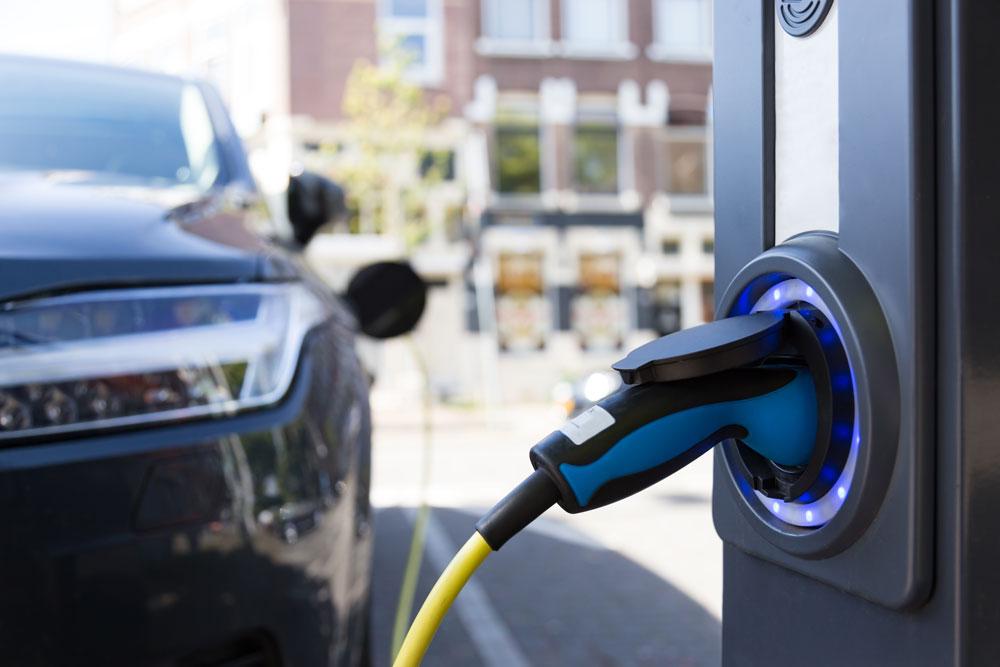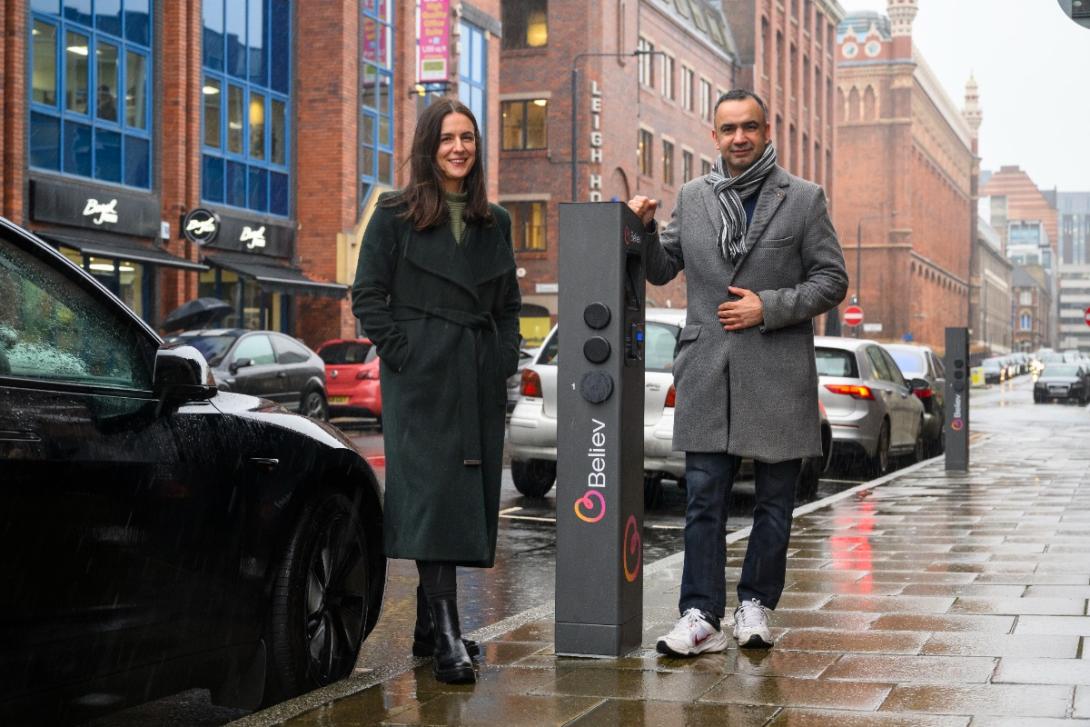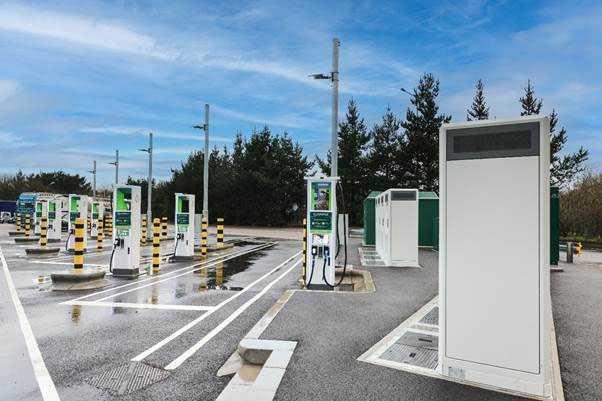As well as increasing the amount of public chargers in the UK, the government’s Electric Vehicle Infrastructure Strategy pledges that charging will become easier and cheaper than refuelling a petrol or diesel car through a range of measures, explored here
The government has published its £1.6 billion-backed Electric Vehicle Infrastructure Strategy, which outlines plans for the UK to reach 300,000 public electric vehicle chargepoints by 2030.
The strategy includes pledges that charging will become easier and cheaper than refuelling a petrol or diesel car, while new legal requirements on operators will see drivers of EVs able to pay by contactless, compare charging prices and find nearby chargepoints via apps.
The strategy acknowledges that chargepoints can sometimes be difficult to find, difficult to use and may turn out to be in use or broken when a driver reaches them. Even paying for charging can be unnecessarily complicated.
The new strategy sets out the government’s aim to expand the UK’s charging network, so that it covers the entire country – as well as improving the consumer experience at all chargepoints, with significant support focused on those without access to off-street parking, and on fast charging for longer journeys.
It will bring in new legislation in summer 2022 to improve people’s experience when using public chargepoints. The regulations will be overseen and monitored by a public body.
The government says it will work with industry to open data so that drivers can access real time information about chargepoints across the public network, rely on the public charging network, compare prices and can pay for their charging easily, whoever the chargepoint provider.
It will also mandate reliability standards to ensure consumers have confidence wherever they travel in the UK. The government will also support fleets by introducing payment roaming across the public chargepoint network.
Launching the strategy, Transport Secretary Grant Shapps said: “No matter where you live – be that a city centre or rural village, the north, south, east or west of the country – we’re powering up the switch to electric and ensuring no one gets left behind in the process.
“We’re ensuring the country is EV-fit for future generations by the end of this decade, revolutionising our charging network and putting the consumer first.”
Local charging
£500 million will be invested to bring competitively priced public chargepoints to communities across the UK. This includes a £450 million Local Electric Vehicle Infrastructure (LEVI) fund, which will boost projects such as EV hubs and innovative on-street charging.
A pilot scheme for the LEVI fund will see local authorities bid for a share of £10 million in funding, allowing selected areas to work with industry and boost public charging opportunities.
The LEVI funding includes up to £50 million to fund staff to work on local challenges and public chargepoint planning – ensuring that any development complements all other zero emission forms of travel, such as walking and cycling.
Meanwhile, the existing £950 million Rapid Charging Fund will support the rollout of at least 6,000 high powered super-fast chargepoints across England’s motorways by 2035.
The government also pledges to continue addressing any barriers to private sector rollout of chargepoints, such as local councils delaying planning permission and high connection costs.
Making charging easier
The government is mandating that operators provide real-time data about chargepoints. This will ensure that consumers can compare prices and seamlessly pay for their charging using contactless cards. They will also be able to use apps to find their nearest available chargepoint.
These plans will also require a 99 per cent reliability rate at rapid chargepoints to give consumers confidence in finding chargepoints that work wherever they travel.
There will also be work to improve accessibility at public chargepoints for disabled users. The government will work in partnership with Motability and have commissioned the British Standards Institute (BSI) to develop accessible charging standards. These standards will provide guidance to industry and allow drivers to easily identify which chargepoints are suitable for their needs.
Industry reaction
The strategy begins to remove some of the constraints to continued future growth of the EV charging network, believes Jamie Hamilton, automotive director and head of electric vehicles at Deloitte. He said: “The Electric Vehicle Infrastructure Strategy adds important momentum to the journey towards an all-electric future and race to net zero. The commitment of reaching 300,000 public chargepoints by 2030 will help alleviate anxiety amongst the one in three UK households who don’t have off-street parking, making access to EVs more equitable in the future.
“With car manufacturers and others within the private sector also making significant commitments to electric mobility, this strategy begins to remove some of the constraints to continued future growth.”
Jacob Roberts, Transport Policy Manager at the Association for Renewable Energy and Clean Technology (REA), believes that the government’s ambitions can be achieved, but that investment needs to be mobilised at pace. He said: “The REA strongly supports the Government’s commitment to delivering a world-leading EV charging infrastructure network that meets the needs of all EV users. By 2030, the Government expect around 300,000 public chargepoints will be needed to enable the transition to EVs – and we believe that this can be achieved, with this rapidly expanding industry having delivered 37 per cent growth in chargepoint numbers in the last year alone.
“This growth can only be maintained, however, if investment can be mobilised at pace. We welcome the Government providing funding to overcome market failures and speed up local rollout of EV chargepoints, whilst allowing room for continued private investment to grow the UK’s public EV charging network. The Government’s next step should now be to remove the practical and administrative barriers which too often delay new chargepoint projects.”
Regarding the consumer regulations, Jacob Robers said: “These regulations set the standards operators are expected to meet and will improve the overall charging experience. We are particularly pleased that the regulations include requirements for interoperability and roaming – something the REA has long argued for.”
Toddington Harper, CEO of GRIDSERVE, said: “This decade is critical for the UK’s electric vehicle transition. With the 2030 ban on new petrol and diesel vehicles quickly emerging, we must ensure that we have the charging infrastructure in place to support current and future electric vehicle drivers.
“We welcome the Government’s commitments to expanding the UK’s charging network, and it’s crucial these commitments are met with action. The race is now on for the industry to accelerate the deployment of chargers across the country, giving drivers in all corners of the UK access to dependable charging, and in turn, complete confidence to make the switch to electric vehicles.”
Increase in scale and urgency
Chris Pateman-Jones, CEO of Connected Kerb believes that the strategy sends a clear signal that the rollout of EV charging needs to increase in scale and urgency – and that all corners of the country is covered by a charging network. He said: “Now, the work is on for the industry to ramp up the deployment of chargers in towns, villages, cities and across motorway networks, to ensure that no one gets left behind in the EV transition and that all drivers are supported with convenient, reliable and affordable charging solutions.”
“For on-street charging, councils are in a unique position to facilitate the mass rollout of EV chargers to support their residents without access to off-street parking. By partnering with independent charge point operators, councils can unlock the private investment needed to accelerate the deployment of chargers at the scale required to meet the UK’s charging needs.”
Fiona Howarth, CEO of Octopus Electric Vehicles, is pleased to see a range of chargers included in the strategy. She commented: “It’s great to see support for a broad range of reliable charging - from high speed convenient rapids for topping up on longer journeys; to affordable local charging for regular use.
“The reality is that most people won’t use rapid chargers often - alternatively using home, workplace, kerbside and community charging that cost as little as £5 to fill up, instead of up to £40 at a rapid. But having an increasing base of reliable rapid chargers will continue to build confidence and encourage more people to make the switch to clean, green driving.”
Ian Johnston, the CEO of Osprey Charging is pleased the strategy will look at providing critical infrastructure to the areas that are as yet underserved. He said: “This announcement by the government is an important step towards ensuring that we have the right number of charging points in all locations across the UK. This is crucial to give everyone the confidence that when they make the switch to electric, they will be able to charge as easily as they refuel today - whenever and wherever they are. These charging stations simply must be reliable, easy to navigate and importantly, accessible for all.
“There are already many billions of pounds of private investment committed for the deployment of charging infrastructure across the UK from networks like Osprey, and the announcements today will allow this funding to provide the critical infrastructure to the areas that are as yet underserved – notably the motorway service areas and the Local Authority towns and cities across the nation. We look forward to working with the government to help bring this strategy to life, delivering a high quality, inclusive, open-access and reliable charging network that’s worry free, comfortable and enjoyable to use.”
Location data
The Geospatial Commission has launched a project to explore how location data can be better utilised to support planning and delivery of electric vehicle charge points by local authorities.
The Geospatial Commission discovery project includes workshops with 10 local authorities to identify challenges and opportunities for better use of location data in the rollout of EV chargepoint infrastructure. This project will be undertaken by technical specialists Frazer-Nash Consultancy.
Dr Steve Unger, Commissioner at the Geospatial Commission, said: “Location data will play a key role in planning the UK’s transition to electric vehicles and help make net zero a reality. Through this project, the Geospatial Commission will understand the challenges faced by local authorities who wish to exploit location data. By working together, we will be able to unlock the potential for data-driven innovation in transport.”
The following local authorities are involved in the project: Oxfordshire County Council; City of York Council; Norfolk County Council; Greater Manchester Combined Authority; West Sussex County Council; Cornwall Council; Kent County Council; Leeds City Council; Wiltshire Council; and Cheshire East Council.






